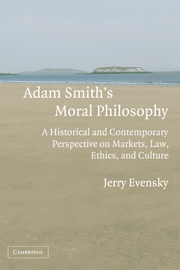 Adam Smith's Moral Philosophy
Adam Smith's Moral Philosophy Book contents
- Frontmatter
- Contents
- Preface
- Adam Smith's Moral Philosophy
- PART ONE ON ADAM SMITH'S MORAL PHILOSOPHICAL VISION
- PART TWO ON THE PLACE OF THE WEALTH OF NATIONS IN ADAM SMITH'S MORAL PHILOSOPHICAL VISION
- PART THREE ON ADAM SMITH'S MORAL PHILOSOPHICAL VISION AND THE MODERN DISCOURSE
- 10 “Chicago Smith” versus “Kirkaldy Smith”
- 11 Toward a Dynamic Three-Dimensional Analysis
- 12 The Liberal Plan and the Quandary of Capital
- Epilogue: On the Human Prospect
- References
- Index
10 - “Chicago Smith” versus “Kirkaldy Smith”
Published online by Cambridge University Press: 11 November 2009
- Frontmatter
- Contents
- Preface
- Adam Smith's Moral Philosophy
- PART ONE ON ADAM SMITH'S MORAL PHILOSOPHICAL VISION
- PART TWO ON THE PLACE OF THE WEALTH OF NATIONS IN ADAM SMITH'S MORAL PHILOSOPHICAL VISION
- PART THREE ON ADAM SMITH'S MORAL PHILOSOPHICAL VISION AND THE MODERN DISCOURSE
- 10 “Chicago Smith” versus “Kirkaldy Smith”
- 11 Toward a Dynamic Three-Dimensional Analysis
- 12 The Liberal Plan and the Quandary of Capital
- Epilogue: On the Human Prospect
- References
- Index
Summary
The “Chicago School” of economics (Reder, 413), home of such leading lights as Frank Knight, Theodore Schultz, George Stigler, Milton Friedman, Gary Becker, and many other deservedly esteemed scholars, lays claim to Adam Smith as one of its own, for it traces its heritage directly to Smith.
The “economic approach to human behavior” (Becker, 1976) that is emblematic of the Chicago paradigm begins with the assumption that humans can be represented as homo economicus, beings driven by a single motive: personal utility maximization. Smith, according to his Chicago disciples, is the visionary who established this foundation and thus made the economic approach to human behavior possible.
Indicative of the admiration Chicagonians feel for Smith in appreciation for his founding contribution to the Chicago paradigm, George Stigler writes that while many of the theories embodied in the WN are failures because Smith's “successors [have] either ignored or rejected [them] out of hand. …
Smith had one overwhelmingly important triumph: he put into the center of economics the systematic analysis of behavior of individuals pursuing their self-interest under conditions of competition. This theory is the crown jewel of The Wealth of Nations, and it became, and remains to this day, the foundation of the theory of the allocation of resources… . [Smith's] construct of the self-interested individual in a competitive environment is Newtonian in its universality.
(Stigler, 1976, 1200–1, 1212)- Type
- Chapter
- Information
- Adam Smith's Moral PhilosophyA Historical and Contemporary Perspective on Markets, Law, Ethics, and Culture, pp. 245 - 264Publisher: Cambridge University PressPrint publication year: 2005


